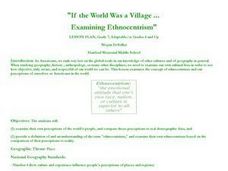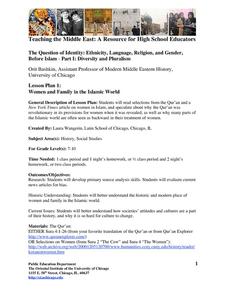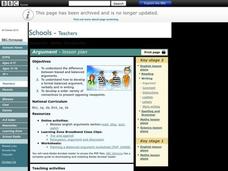Curated OER
Our Unfinished Work
Students investigate the racism elements after the election of President Barack Obama. In this racism lesson, students read a recent article about 'post-racial' society. Students compile a list of achieving a post-racial society and...
National Endowment for the Humanities
Faulkner's As I Lay Dying: Burying Addie's Voice
Students explore the use of voice and title in William Faulkner's, "As I Lay Dying". They identify and discuss the use of image, symbols and narrative voice in the story.
Curated OER
If the World Was a Village...Examining Ethnocentrism
Seventh graders examine their own perceptions of world's people, compare those perceptions to real demographic data, provide definition and understanding of term "ethnocentrism," and examine their own ethnocentrism based on comparison of...
University of Chicago
Women and Family in the Islamic World
How does the Qur'an detail the role of women? What modern social issues are linked to Islamic law? Address these questions with your young historians through close analysis of primary and secondary source documents.
Museum of Tolerance
Improving My Community Through Social Action
Action is the heart of change. Encourage class members to not only identify critical social justice issues in their school or community but to take action as well. As individuals or as groups, they research a situation, develop a...
Curated OER
Respecting Diversity
Students explore the concept of philanthropy. In this service learning lesson plan, students read and respond to The Sneetches by Dr. Seuss. Students discuss self-respect and respect.
Curated OER
Depicting Women and Class in a Global Society
Students analyze the evolution of women's work from the 19th century to present day and create artwork depicting women. In this women's roles lesson, students compare and contrast the use of space and color in the two paintings depicting...
Curated OER
Argument
Learners write and discuss opposing points of view. In this argument lesson, students learn to understand what an argument is and they get to argue one side of a disagreement. An alternative written assignment is provided. A worksheet is...
Curated OER
Sexism: From Identification to Activism
Students explore sexism. In this character education lesson, students define sexism and discuss individual behaviors and institutional policies that promote sexism. Students determine how they can be advocates to end sexism.
Curated OER
The "Coal LIfecycle" Scrapbook
Students discover how coal is formed. For this science lesson, students create a scrapbook on the life cycle of coal and show how coal is formed by showing pictures of each stage.
Curated OER
Slowly But Steadily, Madness Descended
Middle schoolers read an article about the chaos that ensued at a bargain store opening. They discuss bias in the way the article is written and the words that are used. They roleplay what might have happened that day at the store...
Curated OER
Moral Development and Gender
Students participate in a class discussion about moral development based on Kohlberg's and Gilligan's moral orientations.
Curated OER
Debating the Issues: Ralph Bunche and Civil Rights
Synthesizing information from a PBS documentary Ralph Bunche: An American Odyssey, its companion website, and several other resources (links to which are provided), high schoolers evaluate whether Bunche did all he could to advance the...
Curated OER
The Significant Contributions of Islamic Women to the Growth and Expansion of Islamic Civilization
High schoolers read and explore the historical evidence that supports the viewpoint that Islamic women have made significant and lasting contributions to Islamic Civilization. They read and analyze secondary and primary sources relevant...
iCivics
Drafting Board: Military Intervention
Should countries use their militaries to stop humanitarian crises in other countries? Learners make claims, organize their reasoning, and provide evidence for their arguments with this rich resource.
iCivics
Drafting Board: Electoral College
Should the president of the United States be voted by the Electoral College or the popular vote? Your young historians will consider the pros and cons of the Electoral College, and make an argument using reasons and evidence provided in...
Curated OER
The Senate : Retention, Abolition, Reform
Young scholars examine the strengths and weaknesses of the Senate in the Canadian Parliament. The role of the Senate is probed as its usefulness is scrutinized.
Curated OER
Fifty Years: From the Little Rock Nine to the Jena Six
Students discuss how the issues surrounding school integration have changed since the Little Rock Nine entered Central High School. They discuss the recent events in Jena, Louisiana. Students write a letter to a school administrator...
National First Ladies' Library
Michigan vs. Ohio State: A Serious Rivalry!
Middle schoolers discuss and research the pros and cons of school rivalries. In particular, they study the Michigan-Ohio State rivalry. Through their research, they think about how media accounts of college football games can be shaped...
Curated OER
Justice for All? Debating the Fairness of the Juvenile Justice System
Pupils discuss treatment of young people by the criminal justice system and debate whether or not that treatment is fair.
Curated OER
The Study of the Spanish-Speaking People of Texas: Understanding Primary Sources
Students analyze Russell Lee's photo essay as a sign of segregation in Texas. They consider the differences between primary and secondary sources and how historians use these sources.






















